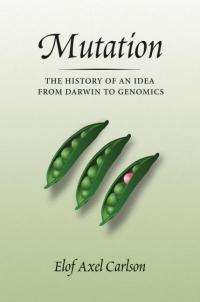Noted science historian Elof Carlson traces how the idea of mutation has changed in 6 generations

Today, most scientists use the term "mutation" to describe a change in an individual gene -- more precisely a minute alteration of its DNA. But the term has also achieved a powerful presence in popular culture, to describe a process by which individuals gain exceptional, often malign, characteristics.
The idea of mutation has changed considerably since Darwin introduced the theory of evolution by natural selection and in his new book Mutation: The History of an Idea from Darwin to Genomics, from Cold Spring Harbor Laboratory Press, geneticist and historian Elof Axel Carlson explores six generations of mutation research, providing the background—the people, the science, and the ideas—for this biological journey. "The idea of mutation" says Carlson, "is based on our observation that everything changes over time." In the life sciences, this observation is the foundation of evolutionary biology and also a major part of genetics. But Carlson argues that evolution is also characteristic of ideas or concepts. "We are limited by the terminology and ideas of the generation in which we grow up, and, as new findings occur, the vocabulary changes to accommodate concepts and data derived from new tools and approaches."
After exploring Darwin's and Francis Galton's concepts of mutation, Carlson shows how the 1900 rediscovery of Gregor Mendel's experiments led to a discontinuous model of evolution by mutation and how cytological investigations led to the chromosome theory of heredity of classical genetics in which there was random mutation in genes. Carlson details how Mendelian and biometric approaches to heredity and evolution were closely tied and how induction of mutations by radiation and chemical mutagens led to biochemical investigations of gene action, shifting attention to the chemistry of the gene. The interpretation of the gene as DNA and the deciphering of the genetic code then gave rise to molecular interpretations of mutation, and eventually the Human Genome Project. This molecular view of mutation impacted evolutionary biology, population genetics, commercial development of plants and animals, and human genetics.
In addition to surveying the idea of mutation in the scientific world, Dr. Carlson also shows that a "somewhat different sense of the term mutation prevails among the general public." This thread is explored in terms of eugenics, radiation, politics, medicine, and the context of today's complex technologies.












